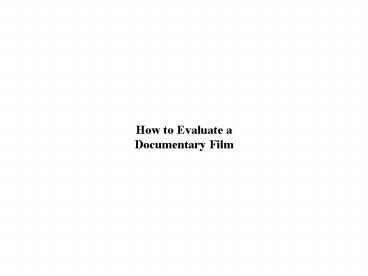How to Evaluate a Documentary Film - PowerPoint PPT Presentation
1 / 6
Title:
How to Evaluate a Documentary Film
Description:
Title: PowerPoint Presentation Author: Elena Razlogova Last modified by: Elena Razlogova Created Date: 1/27/2004 2:46:43 AM Document presentation format – PowerPoint PPT presentation
Number of Views:77
Avg rating:3.0/5.0
Title: How to Evaluate a Documentary Film
1
How to Evaluate aDocumentary Film
2
Some ways documentary films convey arguments
- archival documents, periodicals, diaries,
letters - photographs, ephemeral films
- Ken Burns effect (panning over
documents/photographs) - interviews/talking heads (witnesses, experts)
- voiceover/voice-of-god narration
- editing juxtaposition of video (two different
pieces of footage for example) and audio elements
(voice and music) - reenactments of events
3
Documentary film that uses conventional
documentary elements effectively The Civil War
(PBS, dir. Ken Burns, 1990)
- A history of the Civil War in the United States
- Uses historical photographs, documents,
newspapers, letters, diaries - Uses Ken Burns effectpanning over photographs
or written sourcesto entertain and focus the
viewer - Uses voice-of-god voiceover narration to
advance the story and interpret historical
sources - Uses talking head interviews with experts to
interpret evidence and provide conclusions - Downplays slavery as the central issue of the
Civil War overemphasized states rights as an
issue in the conflict
4
Excellent documentary film made exclusively with
historical footage The Atomic Café (1982)
- A film about living in fear of nuclear war in
the U.S. during the early Cold War. - Uses ephemeral films from the period from the
Prelinger Archives (advertising, educational,
industrial, and amateur) - Uses juxtaposition of archival video and sound
(both voice and music) to produce an
interpretation opposite to the anticommunist view
proposed by historical films it uses - Uses no voiceover or talking heads beyond those
already in the historical footage
5
Documentary film that uses feature film elements
to interpret past events The Thin Blue Line
(dir. Errol Morris, 1988)
- A film investigating an old case where one man
murdered a cop but another one was falsely
convicted for murder - Uses case documents, interviews with witnesses
and the convicted man, as well as new evidence
found by the director - Interviews are highly stylized
- No voice-over narration
- Events of the murder are reenacted by actors
- Uses dramatic music by Philip Glass
- Convincing as a result of the film, the
conviction was overturned
6
Sample midterm question
A 1988 review of The Thin Blue Line in Variety
magazine stated Errol Morris has, in spite
of himself, made a film that succeeds both as an
objet dart and a nonfiction narrative. Visual
design, lightning and editing are impeccable,
with all these elements carefully planned in a
way entirely at odds with a technique of the
ordinary documentary. Explain why Errol
Morriss style seemed so at odds with the
documentary film tradition. What was his
pioneering style? How was his film effective as
an interpretation of a historical event?































